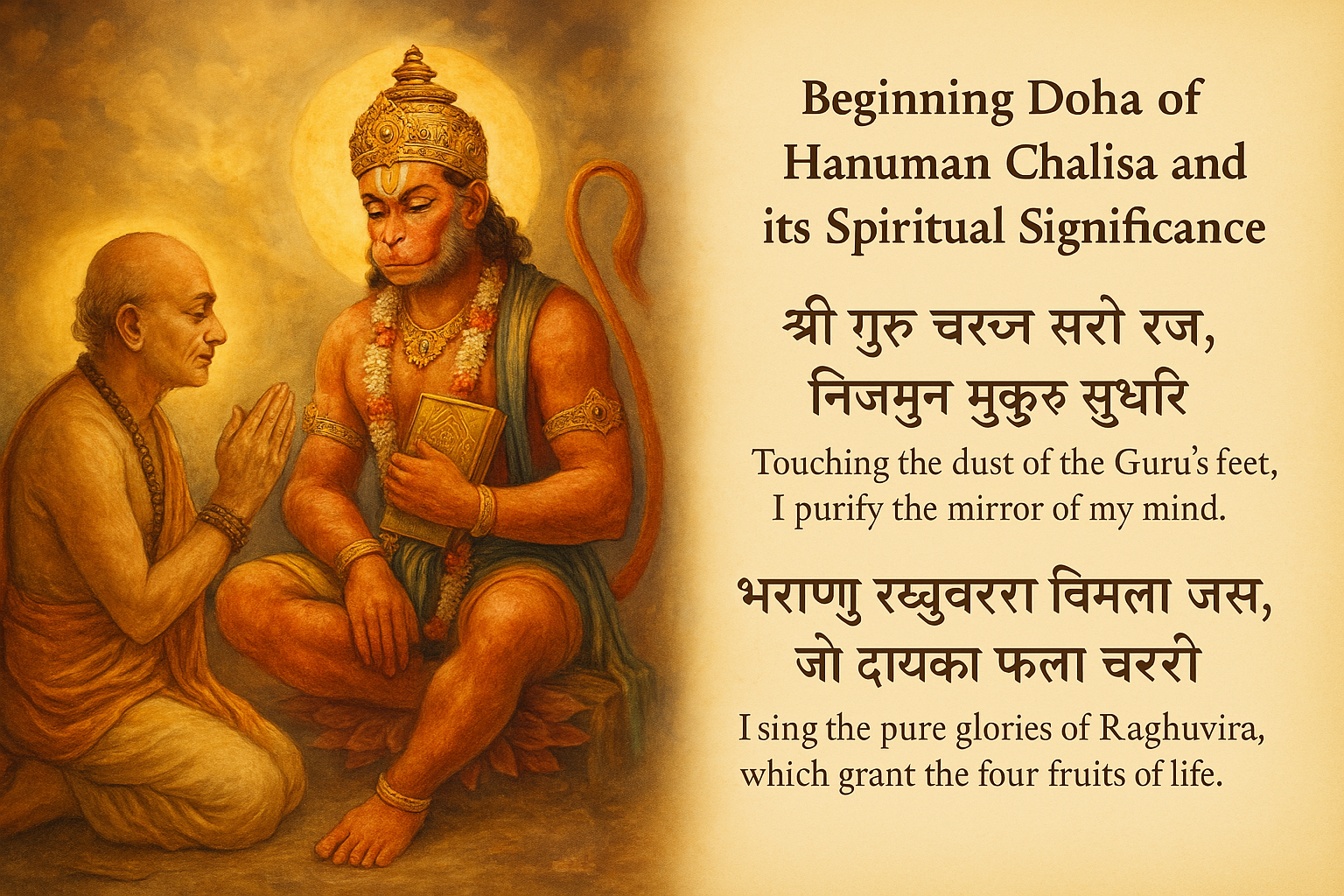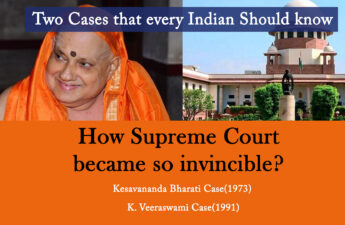Imagine a dusty mirror, dim and clouded, unable to reflect the light of truth. Now picture a devotee, with trembling hands and a heart full of love, gently wiping it clean with the sacred dust of a guru’s feet. This is how Sant Tulsidas begins the Hanuman Chalisa—not with pride, but with surrender, not with knowledge, but with a plea for grace. In these opening dohas, he sets the stage for a journey of devotion, calling upon his guru and the mighty Hanumanji to guide him toward the glory of Shri Ram.
Here are the dohas in their original Devanagari script, followed by a simplified, poetic translation and a deeper exploration of their spiritual essence:
Doha 1
श्रीगुरु चरन सरोज रज, निजमन मुकुरु सुधारि।
बरनउं रघुबर बिमल जसु, जो दायक फल चारि।।
Simple Meaning:
With the holy dust of my guru’s lotus feet, I clean the mirror of my mind.
I sing the pure glory of Shri Ram, who grants life’s four treasures—duty, wealth, love, and liberation.
Doha 2
बुद्धिहीन तनु जानिके, सुमिरौं पवन-कुमार।
बल बुधि बिद्या देहु मोहिं, हरहु कलेस बिकार।।
Simple Meaning:
Knowing I am weak and without wisdom, I call on Hanumanji, the son of the wind.
Grant me strength, understanding, and knowledge, and remove my pain and flaws.
This doha is not just an introduction.
It is a surrender, a soulful plea from the heart of Tulsidas, a devotee lost in love.
He knows one truth:
Without grace, there is no wisdom. Without Guru, there is no vision. Without Hanumanji, there is no Ram.
As Tulsidas also said:
“गुरु बिनु होइ न ज्ञान”
“Without a Guru, there can be no true knowledge.”
The Divine Essence
Tulsidas begins with a confession of his own imperfection. The “mirror of my mind” is his heart, clouded by doubts, desires, and distractions—things we all carry as humans. He knows he cannot see or sing Shri Ram’s glory clearly without help. So, he turns to his guru, whose wisdom is like sacred pollen, soft yet powerful, capable of polishing the soul. This act of surrender is the first step of bhakti: admitting we are small, yet trusting that divine grace can make us whole.
When Tulsidas speaks of Shri Ram’s “bimla jasu” (pure glory), he’s not just praising a king or a god—he’s pointing to a light that fulfills every longing of the human heart. The “four fruits” (dharma, artha, kama, moksha) are life’s deepest desires: to live rightly, to prosper, to love, and to be free. Only Shri Ram, the embodiment of truth and love, can grant these, and Tulsidas yearns to sing of Him with a clear heart.
In doha 2, Tulsidas lays bare his humanity with breathtaking humility. “Buddhiheen tanu” (a body without wisdom) is not just his confession—it’s ours too. As humans, we stumble, we doubt, we falter under the weight of our flaws and sorrows. Yet Tulsidas doesn’t despair. Instead, he turns to Hanumanji, the eternal devotee of Shri Ram, whose strength, wisdom, and purity are boundless.
Hanumanji is not just a warrior or a monkey god—he is the bridge between our frail hearts and the divine. By calling on “Pavan-Kumar” (son of the wind), Tulsidas invokes a force that is swift, unstoppable, and purifying, like a breeze that sweeps away darkness. His prayer for “bal, buddhi, vidya” (strength, intellect, and knowledge) is not for worldly gain but for the ability to love Shri Ram more deeply. And when he asks Hanumanji to “harahu kales bikar” (remove pain and flaws), he’s seeking freedom from the inner chaos that keeps us from God.
Calling Hanumanji — The Divine Messenger
Tulsidas, like a child lost in a forest, calls out to Hanumanji —
Because Hanumanji is not just a deity, he is the living breath of devotion.
He is Pavan-putra, son of the wind —
He moves where minds cannot,
He lifts what the world cannot,
He sees what eyes cannot.
Tulsidas says:
I have no intelligence, no strength, no wisdom.
But you, Hanumanji, are the ocean of all three.
Please make me your instrument.
The Power of Bhakti: A Path of Purity and Surrender
These dohas are not just words—they are a map for the soul. Tulsidas teaches us that bhakti, or devotion, begins with humility. We cannot approach the divine with arrogance or self-reliance. Like a child reaching for a parent’s hand, we must admit our limits and seek grace. The guru’s guidance and Hanumanji’s strength are the twin pillars that lift us toward Shri Ram, whose love is the ultimate destination.
Tulsidas’ choice of Hanumanji as his guide is profound. Hanumanji is the perfect devotee—selfless, loyal, and utterly devoted to Shri Ram. In the Ramcharitmanas, another masterpiece by Tulsidas, Hanumanji’s devotion shines through in moments like this doha:
जेहि सरन गयउ भव निदहि तारयो, ताहि बिनु कौन उबारिहौ।
(Ramcharitmanas, Sundarkand)
Meaning: The one who sought Shri Ram’s shelter crossed the ocean of existence. Without Him, who else can save us?
Here, Tulsidas reminds us that Hanumanji’s power comes not from himself but from his unwavering love for Shri Ram. Hanumanji is the spark of devotion within us all, the voice that whispers, “Surrender, and you will find the way.”
Bhakti is the language of the soul.
It needs no intellect, only love.
No status, only longing.
Tulsidas wrote:
“भक्ति करि सकल सुख संपत्ति निधान।
भव भय बिनसहि राम गुन गान॥”
“Through devotion, you gain all happiness and wealth.
The fear of the world disappears when you sing Shri Ram’s glories.”
A Divine Beginning
The first doha is a gentle whisper to the soul:
Start humbly, call the Guru, call Hanumanji.
You are not enough — but with their grace, you are limitless.
As you chant the Chalisa, know this —
You are not just reciting verses.
You are entering a sacred dialogue with Hanumanji.
You are being held by a divine friend who will walk you to Shri Ram,
Carry your burdens, light your path, and burn your sorrows.
The Spiritual Dance of Human Limits and Divine Grace
What makes these dohas so beautiful is their honesty about human limitations. Tulsidas doesn’t pretend to be perfect—he embraces his flaws and offers them to the divine. This is the essence of spirituality: not becoming flawless, but trusting that God’s love can shine through our cracks. As humans, we are bound by ego, fear, and fleeting desires, but bhakti transforms these chains into wings.
When Tulsidas calls on Hanumanji, he’s showing us that we don’t need to be scholars or saints to reach God. All we need is a sincere heart and a willingness to ask for help. Hanumanji, with his boundless strength and wisdom, becomes our guide, carrying us across the ocean of doubt to the shores of Shri Ram’s love.
This doha is like sitting at the feet of a saint, and hearing:
“You want to understand God?
First, bow your head in humility.
Wipe your mind clean of pride.
Hold the Guru’s feet in your heart.
And call upon Hanumanji — the one who holds Shri Ram in his heart always.”
Tulsidas knew we are flawed. But he also knew that Bhakti doesn’t need perfection.
It only needs surrender.
Another Gem from Tulsidas
To deepen this reflection, let’s look at another doha from the Ramcharitmanas, which echoes the same spirit of devotion:
रामचंद्र रघुपति जपु, हृदय कमल महं राखु।
संतत सुमिरन करत हिय, भव भय मोचन साखु।।
(Ramcharitmanas, Balkand)
Meaning: Chant the name of Shri Ramchandra, the Lord of the Raghus, and keep Him in the lotus of your heart. By constantly remembering Him, you will be freed from the fears of this world.
This doha captures the same purity and power as the Hanuman Chalisa’s opening. Tulsidas urges us to make Shri Ram’s name our anchor, a light that burns away fear and doubt. Like the Chalisa dohas, it’s a call to simplicity: no grand rituals, no complex philosophies—just a heart turned toward God.
The Eternal Call of Bhakti
The opening dohas of the Hanuman Chalisa are a love letter to the divine, written in the ink of humility and sealed with trust. Tulsidas teaches us that spirituality is not a distant peak but a path we walk with small, sincere steps. Hanumanji, with his mighty heart and gentle grace, is our companion, showing us that devotion to Shri Ram can transform even the dustiest mirror into a window of light.
Through these dohas, we feel the essence of bhakti: a love so pure it cleanses, so strong it uplifts, and so simple it fits in every heart. Whether we are rich or poor, wise or wandering, Tulsidas reminds us that Shri Ram’s glory is for all, and Hanumanji’s hand is always outstretched to guide us home.
May these words linger in your soul, like the soft chant of “Jai Shri Ram,” carrying you closer to the divine with every breath.





